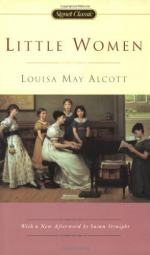“It isn’t made or trimmed,” sighed Meg, faintly, for a sudden recollection of the cost still to be incurred quite overwhelmed her.
“Twenty-five yards of silk seems a good deal to cover one small woman, but I’ve no doubt my wife will look as fine as Ned Moffat’s when she gets it on,” said John dryly.
“I know you are angry, John, but I can’t help it. I don’t mean to waste your money, and I didn’t think those little things would count up so. I can’t resist them when I see Sallie buying all she wants, and pitying me because I don’t. I try to be contented, but it is hard, and I’m tired of being poor.”
The last words were spoken so low she thought he did not hear them, but he did, and they wounded him deeply, for he had denied himself many pleasures for Meg’s sake. She could have bitten her tongue out the minute she had said it, for John pushed the books away and got up, saying with a little quiver in his voice, “I was afraid of this. I do my best, Meg.” If he had scolded her, or even shaken her, it would not have broken her heart like those few words. She ran to him and held him close, crying, with repentant tears, “Oh, John, my dear, kind, hard-working boy. I didn’t mean it! It was so wicked, so untrue and ungrateful, how could I say it! Oh, how could I say it!”
He was very kind, forgave her readily, and did not utter one reproach, but Meg knew that she had done and said a thing which would not be forgotten soon, although he might never allude to it again. She had promised to love him for better or worse, and then she, his wife, had reproached him with his poverty, after spending his earnings recklessly. It was dreadful, and the worst of it was John went on so quietly afterward, just as if nothing had happened, except that he stayed in town later, and worked at night when she had gone to cry herself to sleep. A week of remorse nearly made Meg sick, and the discovery that John had countermanded the order for his new greatcoat reduced her to a state of despair which was pathetic to behold. He had simply said, in answer to her surprised inquiries as to the change, “I can’t afford it, my dear.”
Meg said no more, but a few minutes after he found her in the hall with her face buried in the old greatcoat, crying as if her heart would break.
They had a long talk that night, and Meg learned to love her husband better for his poverty, because it seemed to have made a man of him, given him the strength and courage to fight his own way, and taught him a tender patience with which to bear and comfort the natural longings and failures of those he loved.




